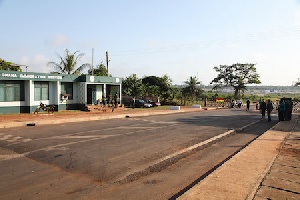Ghana’s security agencies have come under severe criticism from transborder operators for mounting scores of permanent and temporary checkpoints that contravene the ECOWAS convention on transit goods.
The transborder operators cited the Tema-Paga route as the most stressful as the security agencies have put up 42 police and 12 customs checkpoints along the route, which is more than the three checkpoints recommended by ECOWAS to be on that stretch of road including checkpoints at the port, the Paga border and final point of destination.
Police say the checkpoints are valuable measures intended to check robbery on the highways, but the operators argue that security officers are instead using the checkpoints as a tactic to milk cross-border traders and truck operators.
The latest complaints of the operators have raised concerns about efforts of the country’s security hierarchy to stem the trend of subjecting transit operators who pass through the checkpoints to harassment and extortion.
These complaints were made at a stakeholder forum on the ‘Road Governance Caravan’ organised by the Borderless Alliance in Kumasi, as part of efforts to assess the level of competitiveness and performance for the northern section of the Tema-Paga road corridor.
Data gathered by the West Africa Economic and Monetary Union (WAEMU) Road Governance Initiative, widely referred to as OPA (Observatoire des Partiques Anormales), said costs and delays resulting from the various non-tariff barriers, including harassment by police and Ghana Revenue Authority (Customs division) at the various checkpoints have worsened rather than improved in recent times.
Amidst the disturbing findings, complex border procedures have also pushed up the cost of imports, exports and road-based transit trade in West Africa.
Shippers are said to be paying about GH?400 per trip to the Paga border, according to some reports -- which among others was described as loss of revenue to the ports’ freight-forwarders, and transporters in terms of handling.
Ghana, in recent years, has pursued aggressive reforms to make its ports and transit corridors more competitive for landlocked trade partners.
The Port of Tema, which is Ghana’s main port, competes with neighboring ports such as the Port Abidjan in Cote d’Ivoire; Port Lome in Togo; and the Port Cotonou in Benin for transit goods going to landlocked countries.
It is largely feared that the increasing number of Customs and Police checkpoints, with their attendant delays and corrupt practices, could result in many transit operators making neighbouring countries the preferred destination for their trade.
Since beginning of the year, various stakeholders in the export and import industry have held a series of meetings with the Ghana Police Service to find a lasting solution to the problem of delays and extortions arising from mounting these checkpoints.
The stakeholders included the Ghana Ports and Harbors Authority (GPHA), Ghana Shippers Authority (GSA), Burkina Shippers Council, USAID/West Africa Trade Hub, National Road and Transport Facilitation Committee (NFC) and Borderless Alliance
One of the meeting’s major outcomes was the issuance of a directive by the Police Administration, in April, prohibiting police personnel from stopping transit cargo trucks plying the Tema-Paga corridor.
It is against this development that the Borderless Alliance, in close collaboration with key stakeholders and partners, has begun the ‘caravan’ to monitor and assess the level of implementation and compliance to this directive by the Police Administration to its personnel stationed along the corridor.
It is also aimed at eliminating inefficiencies and fighting road harassment, thereby increasing overall transport competitiveness.
The Chief Executive Officer of Ghana Shippers Council, Dr. Kofi Mbiah, in an address read on his behalf noted particularly that ineffective implementation of road governance measures has the potential to reduce competitiveness of shippers in relation to other competitors in the sub-region.
He pointed to a World Bank study that shows a 10 percent increase in road transport cost reduces trade by 20 percent, ultimately limiting economic growth.
He therefore asked that greater attention be paid to trade hold-ups along the country’s transit corridors, in a manner that will not affect competitiveness of shippers and the long-term economic gains of the country and sub-region as a whole.
Dr. Mbiah said recent developments within the corridor are a major concern to all stakeholders, and it requires their collective efforts to curb those challenges.
The Ashanti Regional Minister, Peter Anarfi-Mensah, called for attitudinal change on the part of some public officials, whose responsibility it is to ensure that Ghana derives the utmost benefit from its facilitating efforts.
Click to view details



Business News of Thursday, 6 August 2015
Source: B&FT
54 transborder checkpoints spur complaints
Entertainment
















